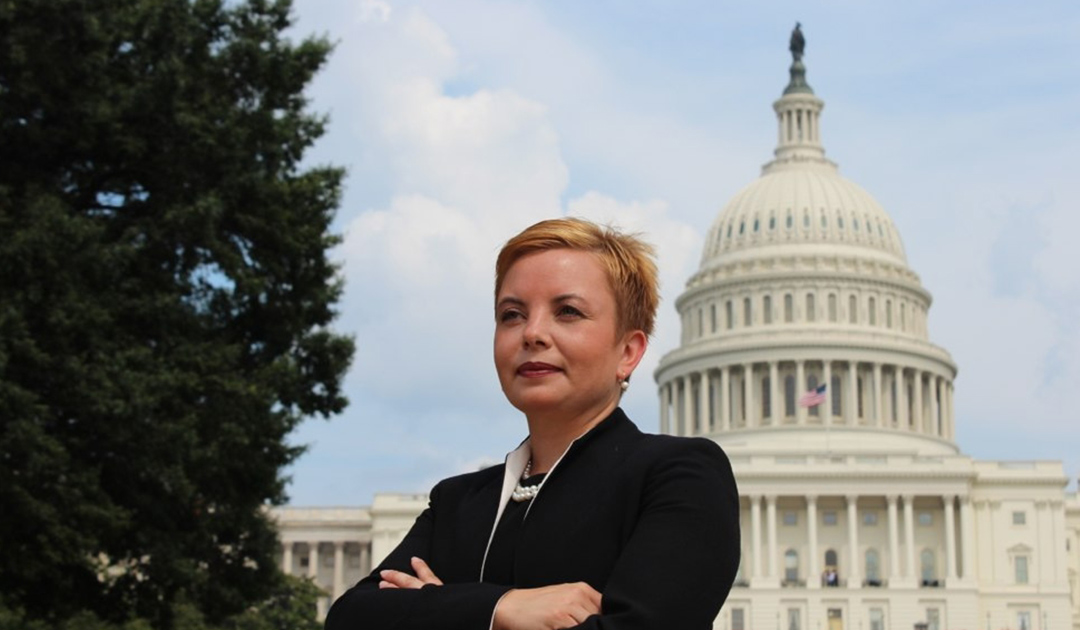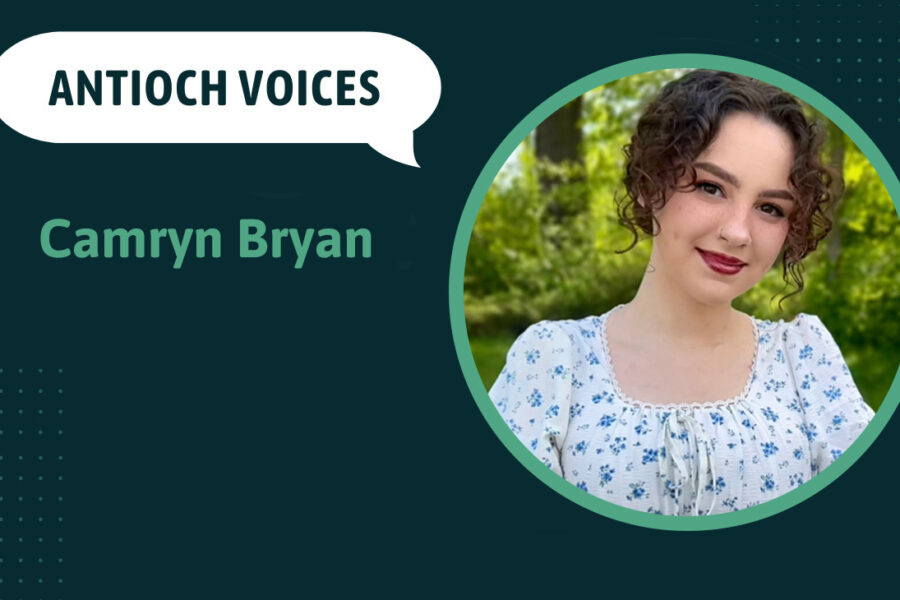When Kader Gümüş came to the part of her doctoral studies in Antioch’s PhD in Leadership and Change, where she needed to choose a topic for her dissertation, she decided to explore the transformative journey from surviving to thriving after intimate partner violence. The final dissertation, published earlier this year, is titled Journey to Well-Being: An Exploration of Thrivership Post-Domestic Violence. It emphasizes the relational nature of healing, highlighting how survivors rebuild their sense of self and reclaim their lives through meaningful connections.
In Gümüş’s professional life, she has extensive experience both as an IT consultant with the U.S. Federal Government and as an advocate for domestic violence survivors. In the PhD program, she was able to combine these experiences with her own scholarly and personal interests, and her dissertation topic gave her the chance to bridge the gap between personal insight and scholarly rigor. “As a survivor,” she says, “this work was both personal and profoundly purposeful.” Central to the dissertation is the concept of “thrivership,” which she defines as moving beyond survival and into a state of flourishing, where survivors experience joy, purpose, and empowerment. Recently, we had a chance to interview Gümüş about her dissertation, her understanding of “thrivership,” and her insights on what it means to be a trauma-informed researcher.
How did you take care of yourself as you undertook this research into trauma, which I know you have experienced yourself?
You need that self-care as a researcher, so you have to give yourself permission. And it took me a long time to understand how much self-care I need in order to exist in this world, just at a normal level, as other people can. So when I did my research interviews, I spaced them with two, three days in between. I only needed eight to twelve [interview subjects], but I had 41 people reach out to me, because there were so many people so excited about the research. I intentionally spaced the interviews out. If it didn’t fit into this week, I scheduled it for next week because that way I gave myself some self-care time.

The processing of that data and the reflecting of that data took me three months, and I had to do it with support from therapy. I did acupuncture. I did a lot of self-care, meditation, and prayer. My dissertation chair was very good about reflective conversations, journaling. Because the stuff that we’re researching is heavy. It retriggers you, even if you think you’ve processed and healed from certain things. So honor that commitment to yourself, because you deserve to have the self-care that you and your body need, that your soul and your body need.
Your dissertation explores the concept of “thrivership” after domestic violence. Can you explain the concept of thrivership and the main elements of it?
Thrivership, as I define it in my dissertation, refers to a long-term, sustainable state of well-being that moves beyond the state of survival. It encompasses reclaiming one’s sense of self, rebuilding identity, experiencing joy and meaning, and creating a purpose-centered life.
Thrivership is not a return to who someone was before trauma—it is a new baseline of flourishing that honors the transformative journey survivors take. The main elements of thrivership identified in my research include personal agency, supportive relationships, emotional regulation, access to systemic resources, and the ability to make meaning from one’s experiences.
You are open in your dissertation about being a trauma survivor, and you use your own position to inform your research. Can you talk a little bit about pursuing academic research into a topic with intense personal resonance? And how did your positionality shape your approach to the research?
As a survivor, this work was both personal and profoundly purposeful. My lived experience gave me an insider’s lens and a deep empathy for the complexities survivors face. At the same time, I was committed to maintaining academic rigor. This dual perspective helped me ask questions that might be missed by detached research and allowed me to create a space of safety and respect for my participants. I was constantly negotiating that insider-outsider boundary—using my experience to build trust, while ensuring that my interpretations were grounded in data and theory. This research wasn’t just about understanding thrivership—it was part of living it.
Can you share your findings on Post-traumatic Growth?
I applied Tedeschi and Calhoun’s model of post-traumatic growth (PTG) to my analysis, which emphasizes five main themes:
- Self-Mastery and Post-Traumatic Growth
- Meaningful Relationships and Support Systems
- Engagement in Meaningful Activities
- Continuous Support in the Healing Journey
- Role of Community Support
The participants reflected each of these in unique ways. They spoke about valuing each day with deeper gratitude, cultivating healthier relationships, discovering inner resilience, pursuing new life goals, and, for some, deepening their spiritual or existential beliefs. These dimensions reveal that growth after trauma is possible—but it is nonlinear and profoundly shaped by both internal and external conditions.
Can you talk a bit about the emic and etic approaches to this research and how you navigated the insider-outsider perspectives?
I used both emic (insider) and etic (outsider) approaches to offer a layered understanding of thrivership. My emic perspective—as someone who has experienced domestic violence—brought emotional sensitivity, contextual knowledge, and deep rapport with participants. My etic stance—grounded in academic training—provided structure, critical distance, and analytical depth. Balancing the two helped me avoid both over-identification and detachment, producing findings that were rigorous yet respectful.
Is it important to have researchers who themselves have lived experience on topics relating to domestic violence survivors?
Lived-experience scholars bring a depth of understanding that cannot be taught—they can ask the right questions, recognize unspoken cues, and challenge dominant narratives with credibility. In fields like domestic violence research, where stigma and systemic silencing are common, these voices are essential. They bridge the gap between theory and reality and ensure that research truly reflects the complexity of survivor experiences.
What advice would you give to others considering pursuing a PhD on topics that are deeply personal or emotionally charged?
Pursuing personal research topics can be healing—but it also requires boundaries, support systems, and self-compassion. I recommend building in self-care as part of the methodology, seeking mentors who understand the emotional labor involved, and remembering that academic rigor does not mean emotional detachment. Trust your insight, but also stay open to surprise. The combination of heart and scholarship is where transformation lies.
How do the elements of connection, disconnection, and healthy growth-fostering relationships play out in your research and in the journey of survivors working towards becoming thrivers?
Abuse thrives in isolation—so it’s no surprise that connection, and the absence of it, emerged as a central theme in my findings. Many participants described a deep disconnection during the period of abuse: from themselves, their identities, and their communities. Healing often began with reconnection—to safe (therapeutic) individuals, new communities, their inner selves, and a new meaning and purpose in life. This insight aligns closely with Relational Cultural Theory (RCT), which emphasizes that we grow through and within relationships. While RCT had not yet been published when I conducted my research, my findings strongly resonate with its core principles. I’m deeply grateful to scholars like Elizabeth Holloway and Harriet Schwartz for advancing this vital framework. Methodologically, I found existing approaches—Situational Analysis and Thematic Analysis—each had limitations when used in isolation. By combining them, I developed Exploratory Situational Thematic Analysis (ESTA), a hybrid method that allowed me to center relationality and interconnectedness within an Ecological Systems Framework. Thrivership was grounded in the cultivation of growth-fostering relationships that were validating, empowering, and trustworthy. Rebuilding trust in others—and in themselves—was foundational to each participant’s transformation.
What does framing the discussion using Ecological Systems Theory illuminate? Can you provide an example of how micro, meso, and macro systems may impact a survivor to reach, or struggle to reach, thrivership?
Bronfenbrenner’s Ecological Systems Theory helped me examine how survivors’ environments shape their healing. At the micro level, self-mastery and healing the self are foundational—this includes emotional regulation, reclaiming agency, and rebuilding one’s internal narrative. It also involves close relationships with friends, family, and therapists that provide emotional safety. At the meso level, the interaction between workplaces, courts, and service providers can either reinforce healing or create barriers. At the macro level, societal stigma, gender norms, and policy inequities shape survivors’ access to resources.
For example, in my dissertation, one participant described how her journey toward thrivership was supported by trauma-informed flexibility and understanding from her employer—a meso-level influence that provided emotional safety and stability. In parallel, she had access to affordable mental health services due to progressive regional policy, reflecting the macro-level conditions that enabled sustained healing. This participant’s experience illustrates the dynamic interplay between systems in Bronfenbrenner’s ecological model, showing how supportive structures at both the organizational and societal levels can significantly impact a survivor’s ability to move beyond survival and into a thriving state. Others struggled because of court systems that retraumatized them or workplaces that penalized them for trauma-related challenges. Framing the discussion this way helps us move beyond individual responsibility to a systems-based accountability for survivor well-being.
If you could implement one major change in policy or practice to better support survivors, what would it be?
I would implement long-term, trauma-informed, and survivor-centered support systems—especially in mental health and workforce development, so much of our life in the United States revolves around our workplace identity, yet we do not have strong support mechanisms in place that foster the healing and thriving of the workforce. This includes trauma-informed leaders, flexible work schedules, leave policies that incorporate mental health breaks and self-care, and access to healthcare with mental health policies. Too often, support services are crisis-based and short-term, while healing from domestic violence is a lifelong process. Thrivership requires stable housing, flexible and supportive employment, and mental healthcare that acknowledges trauma’s impact over time. If we want survivors to truly thrive, we must shift from crisis response to sustainable support structures that recognize their full humanity, autonomy, and potential, and not to be forgotten, the dignity of the individuals.
What is academia’s responsibility in the thrivership process?
Academia plays a critical role in the thrivership process. Education must be trauma-informed and actively incorporate trauma-awareness into its curriculum. Mental health programs, in particular, should treat domestic violence trauma as a core component, not an elective topic. We cannot effectively prepare the leaders of tomorrow without equipping them to understand, navigate, and lead within the realities of trauma. Trauma-informed education is not optional—it’s essential for cultivating resilient, compassionate, and effective leadership.





